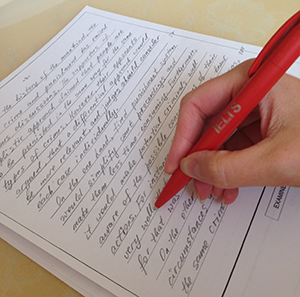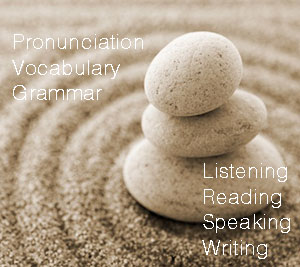 Writing essays can be fun. It is a creative process that engages your thinking and allows you to express your opinion on various subjects. Strong writing skills are especially necessary for potential students because many professors will request essays as home assignment. Strong writing skills will definitely stand in good stead if people write articles for websites or blogs.
Writing essays can be fun. It is a creative process that engages your thinking and allows you to express your opinion on various subjects. Strong writing skills are especially necessary for potential students because many professors will request essays as home assignment. Strong writing skills will definitely stand in good stead if people write articles for websites or blogs.
How could a person develop writing skills for IELTS exam? First of all, consider taking an online preparation course IELTS-online. It is a great opportunity to train your writing in a systemic way and to develop the strategies you need to achieve the best possible score in the IELTS.
In addition, here are some tips for your self-study.
1. Read various articles every day
Attentive reading will not only help you to get ideas about the topics you don’t know much, it will enrich your vocabulary and writing style. For instance, if you read BBC, the Economist and Forbes articles on distant education, you will learn many controversial facts about this phenomenon. In addition, you can pay attention to some interesting grammar structures, collocations and connections between the ideas.
2. Learn less common vocabulary as collocations
Reading will be more beneficial for you if you take notes. The best way to enhance your vocabulary quickly is to copy phrases or even grammar structures in a special file and learn them later. There is at least one way to check if a word is a less frequent one: if you use Macmillan online dictionary, you can check the colour of the word. If it is black, there is some chance that IELTS examiner will consider it less common. If it is red, it belongs to 7500 most frequent English words. The dictionary is only a guiding line, IELTS assessors most probably use another system which is not disclosed to public.
3. Plan
A good plan is 50% of your successful essay. At first you can spend 10 or even 20 minutes planning your ideas. Later you will gradually decrease the time of planning to three minutes and stick to them during the real exam. The best way to plan is to draft the main idea of each body paragraph and use 2-3 phrases (NOT sentences, just ideas) to present your arguments and examples.
You plan should also take into consideration all parts of the task. If the assignment is to give your opinion, then it is one part only. If the assignment is to discuss two points of view and give your opinion, then there are three parts.
4. Use a reliable structure
Any essay needs an excellent introduction (better specific than general), a balanced body and a summarising conclusion. The body can comprise 2 or 3 paragraphs, so the whole essay will have 4 or 5 paragraphs.
Each body paragraph requires a strong topic sentence. It should be simple and precise, giving the main idea of the paragraph. All other sentences should develop that idea; that way you will easily adopt “one paragraph-one idea” approach.
An opinion essay, a discussion essay and a cause-and-effect essays will have slightly different body structure, but all essay types need introductions and conclusions.
5. Choose ideas carefully
Before planning each paragraph, make sure to read and reread the assignment. This way you can avoid the common mistake: when people shift away from the task and write about something else. Try to find valid arguments asking yourself the question “Why” and use vivid examples to illustrate your ideas.
6. Use correct connectors
Just as your paragraphs are connected by logical structure, your sentences need to be connected by special devices. Look through the file with Essay cohesive devices to learn any linkers that you don’t know. You can also read essay samples and see how the authors used connectives. When students first learn about connectors, they are tempted to overuse them. So, just check that you neither underuse, nor overuse the linkers.
7. Practice referencing
One excellent strategy to kill two birds with one stone – to avoid both the overuse of connectors and vocabulary repetition – is to use referencing devices. Those include words like “it, do, they, the former, the latter, which, this, that, these, those“. A tricky thing about connectors is not to use them in ambiguous situations. While checking students’ essays, sometimes I can encounter wrong referencing such as: “Parents should communicate more with their children. They need love and attention.” Here it is not clear who needs love and attention, parents or children. One way to avoid such mistakes would be to use “who“, then we would have: “Parents should communicate more with their children, who need love and attention.”
8. Check your grammar
A good IELTS essay will have a variety of grammar structures: different types of complex sentences (with who, that, when, while, although), conditional mood, inversion, participial constructions, etc. It doesn’t mean that you can’t use simple sentences, on the contrary, they add more variety to your style. After writing your essay, calculate the number of various structures and think how you could improve the variety.
Punctuation is a common stumbling block. You can lose the whole point or even two points for Grammar criterion if you make several punctuation mistakes. So, the best strategy is to learn punctuation rules in great detail and then use one minute to review punctuation in your essay every time you write.
Another widespread difficulty concerns articles. Again, you can study articles chapters in several grammar books and use one minute to review the articles in your essay.
9. Monitor your time
Most students complain that it takes them too long to write their first essay, sometimes even four hours. It is okay. During your first attempts use as much time as necessary, you will train to write quickly later, when you feel more confident. But, if you can’t write an essay in 40 minutes, it may be wise to postpone your IELTS exam till the time when you have practiced enough.
You will need to write on IELTS answer sheets in order to estimate time correctly.
10. Use essay correction service
Even if you have no time or money for regular individual lessons with an experienced IELTS tutor, you can still benefit from IELTS essay correction service. You can get comments about a couple of essays and identify your areas of improvement. Then, several essays later, you can order essay correction again and check your progress.
Finally, students get maximum efficiency if they practice writing, at least, three times per week. Those who practice every day learn even quicker and make it a habit to organise their thoughts in writing.
 Русский
Русский English
English



